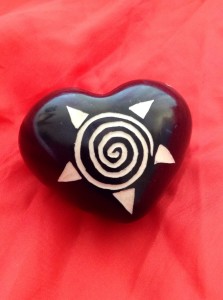Happy Valentine’s Day! Not only is today filled with hearts, flowers, and love, but the entire month of February is American Heart Month. In Western medicine, we usually think of your Heart simply as an organ that pumps blood and is prone to heart attacks as we get older. In addition, heart health is in the back of our minds when we regulate our blood pressure, check cholesterol, and exercise to benefit our health.
In Chinese medicine, however, beyond moving blood throughout your body, your heart has other functions as well. Your heart is the organ system that houses something called Shen, which encompasses your mind, memory, consciousness, and  spirit. While these are activities that are attributed to your brain in Western medicine, we tend to intuitively know that your heart is an organ of feeling or spirituality. In fact, much of our language about the heart refers to it as an organ of feeling. Terms such as someone “tugging on our heartstrings”, knowing things in your heart”, or having a “broken heart”, and even the symbolic Valentine’s heart are all speaking to an emotional organ rather than simple a muscle that pumps blood. Of course, your heart does pump blood, but in Chinese medicine, that function is secondary to its job of housing your Shen.
spirit. While these are activities that are attributed to your brain in Western medicine, we tend to intuitively know that your heart is an organ of feeling or spirituality. In fact, much of our language about the heart refers to it as an organ of feeling. Terms such as someone “tugging on our heartstrings”, knowing things in your heart”, or having a “broken heart”, and even the symbolic Valentine’s heart are all speaking to an emotional organ rather than simple a muscle that pumps blood. Of course, your heart does pump blood, but in Chinese medicine, that function is secondary to its job of housing your Shen.
The health of your heart is reflected in your face. It is said that you can look into someone’s eyes to see the spirit, or Shen, of that person. The sensory organ related to the heart is your tongue, in that your tongue gives you the ability to form words–a way of projecting your Shen.
The element associated with your Chinese heart is fire, and as such it’s a warm and active organ. Its activity is responsible for moving blood throughout your body, but it is also the activity of your mind and the warmth of your body which animate you as a human being.
In Chinese medicine, the organ systems are associated with an emotion, and the emotion associated with the heart is joy. This can be a double-edged sword, in that too much joy can become mania. In addition, as the home of your Shen, your heart is your connection to your spirituality, your connection with the universe, and your relationship to the divine–however you choose to define it.
Because your heart is the home of consciousness, it has some relationship to most emotional disturbances, notably anxiety and insomnia. When you become out of touch with reality to the point of mental illness, your heart is always involved. Physical pathology associated with your heart includes palpitations (the sensation of skipped heartbeats), insomnia, vivid dreams, chest pain, and gum problems. Heart pathology may also reflect the fire element, including signs of excess heat in your body, such as feeling hot, thirst, dark urine, craving cold foods or drinks, and a red face.
The key to nourishing your heart is in connection. Connecting with your sense of purpose through journaling and self-exploration, connecting with others in social situations, and connecting to the divine through prayer and meditation are all nourishing to your heart. Celebrating the seasons and spending time in nature are also ways of connecting with creation. Finding ways to be joyous is honoring your heart and the Shen within.
Nutritionally, foods that bring you joy feed your heart. Meals that have been prepared with love, foods you love to eat, and gathering with friends and family for a meal are all heart nourishing. The taste associated with your heart is bitter; essentially the taste of that which has been burned by elemental fire. Bitter foods such as especially dark chocolate and bitter greens are stimulating to your heart. In addition, the color red is associated with your heart, so red foods and beverages are nourishing to your Chinese heart. So stock up on tomatoes, red peppers, apples, a little (very little) red meat, and red wine.
The next time you are full of joy or feel something with all your heart, remember that in Chinese medicine, your heart is actually the keeper of all your feelings.
Excerpted from Simple Steps: The Chinese Way to Better Health



